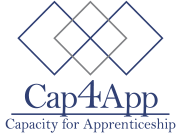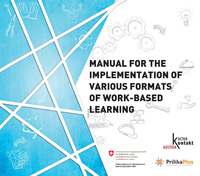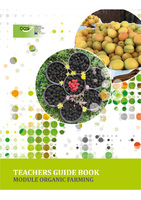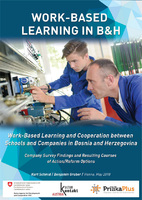Über Österreichs Grenzen hinaus: Wir beraten. Wir gestalten mit.
Unsere Schwerpunkte:
- SkillsAustria – EuroSkills – WorldSkills: www.skillsaustria.at
- Know-how-Transfer
- ReferNet
- EU-Projekte
Über Österreichs Grenzen hinaus: Wir beraten. Wir gestalten mit.
Unsere Schwerpunkte:

Rund zwei Drittel der unselbständig Beschäftigten in Europa sind bei KMUs beschäftigt. Die Wahrscheinlichkeit, dass diese Betriebe auch Ausbildungsbetriebe sind, ist verhältnismäßig gering. Als Hauptgründe für die geringe Ausbildungsbereitschaft gelten der Mangel an zeitlichen und personellen Ressourcen, unzureichende Kenntnis der Gesetzeslage und der Verwaltungserfordernisse. Darüber hinaus werden die Vorteile der betrieblichen Ausbildung von den KMUs oftmals nicht erkannt.
Im Rahmen des Erasmus+-Projektes wurden in elf Ländern (Belgien, Bulgarien, Frankreich, Italien, Lettland, Rumänien, Spanien, Tschechien, Zypern, Serbien und die Türkei) „Apprenticeship-Coaches“ zu qualifizierten Beraten ausgebildet, die KMUs zur Teilnahme als Ausbildungsbetriebe motivieren sollen. Zur Unterstützung der Apprenticeship-Coaches wurden ein umfangreiches Instrumentarium und Beratungsunterlagen entwickelt: „EU template apprenticeship support toolbox“ (https://www.ac4sme.eu/tips-tools/).
Aufgrund ihrer Erfahrung als Länder mit etablierten Lehrlingssystemen fungierten Österreich (und Deutschland) primär als Ideengeber, wissenschaftliche Begleiter und „kritische Freunde“. Der Projektlead lag bei Eurochambres, Projektpartner waren die Arbeitgeberorganisationen der angeführten Länder. Das ibw unterstützte den Projektpartner WKO mit seiner wissenschaftlichen Expertise und seiner breiten Palette an Entwicklungstools.
Dieses Projekt wurde mit Unterstützung der Europäischen Kommission finanziert.
Die Verantwortung für den Inhalt dieser Veröffentlichung trägt allein der Verfasser;
die Kommission haftet nicht für die weitere Verwendung der darin enthaltenen Angaben.
AC4SME – Apprenticeship Coaches for SME – is a large scale European project launched under the coordination of EUROCHAMBRES and implemented by Chambers of Commerce & Industry in 12 countries (Austria, Belgium, Bulgaria, France, Italy, Latvia, Romania, Spain, Czech Republic, Cyprus, Serbia und die Turkey).
AC4SME is a response to the observation that Small and Medium-sized enterprises are not as much involved in apprenticeship than larger companies, whereas these SMEs represent two-third of private sector employment in Europe. Main obstacles encountered by SMEs to offer apprenticeship placements are:
The main objective of AC4SME is to involve a growing number of SMEs in apprenticeship.
AC4SME trained about 26 SME apprenticeship coaches in Chambers of Commerce. These coaches have been provided with adequate tools and skills in order to stimulate and convince SMEs to offer more apprenticeship placements. In this way, the 26 apprenticeship coaches will offer direct guidance to SMEs willing to host an apprentice. For the support apprenticeship coaches, an extensive toolbox has been developed.
ibw supported the project partner WKO by providing scientific expertise and with its broad range of development tools.
The European Commission support for the production of this publication does not constitute an
endorsement of the contents which reflects the views only of the authors, and the Commission
cannot be held responsible for any use which may be made of the information contained therein.
Kontakt/Contact: Kurt Schmid
Projektzeitraum/Project duration: 2017 - 2018

Ziel des Erasmus+ Projekts ist der Aufbau und die Stärkung der Kapazitäten der Kroatischen Wirtschaftskammer im Bereich Lehrlingsausbildung durch...
... Schulung von 20 (regionalen) Kammermitarbeiter/innen als Lehrstellenberater/innen
... Entwicklung von Elementen, Instrumenten sowie Materialien zur Steigerung der Attraktivität und der Qualität in der Lehrlingsausbildung (Kriterien für Lehrbetriebe, Handbücher für Lehrstellenberater/innen und Ausbildner/innen, Entwicklung von Ausbilderkursen etc.)
... Aufbau einer Datenbank und eines Registers von Lehrbetrieben und Ausbildnern/innen
Das ibw unterstützte den Projektpartner WKO mit seiner wissenschaftlichen Expertise und seiner breiten Palette an Entwicklungstools.
Dieses Projekt wurde mit Unterstützung der Europäischen Kommission finanziert.
Die Verantwortung für den Inhalt dieser Veröffentlichung trägt allein der Verfasser;
die Kommission haftet nicht für die weitere Verwendung der darin enthaltenen Angaben.
Erasmus+ funded project to strengthen the capacity of the Croatian Chamber of Economy (CCE) in the field of apprenticeship training by...
... qualifying 20 (regional) CCE employees as apprenticeship advisers/coaches...
... developing elements, instruments and materials that foster attractiveness and quality in apprenticeship training (quality criteria for the approval of training companies, manuals for apprenticeship advisors, companies and in-company mentors; educational programme for in-company mentors)
... establishing a database and register of accredited SMEs and in-company mentors
ibw supported the project partner WKO by providing scientific expertise and with its broad range of development tools.
The European Commission support for the production of this publication does not constitute an
endorsement of the contents which reflects the views only of the authors, and the Commission
cannot be held responsible for any use which may be made of the information contained therein.
Kontakt/Contact: Kurt Schmid
Projektzeitraum/Project duration: 2016 - 2018

Initial vocational education in Bosnia and Herzegovina takes place exclusively in a school environment – at various vocational schools. Students do have the possibility to try practical training at companies and/or school workshops and acquire skills. However, when it comes to the scope, depth and quality, these options – and in particular work-based learning – are frequently marginal
and insufficient to achieve meaningful learning outcomes.
To foster WBL in B&H, a company survey was conducted and a WBL-manual compiled:
Manual for the Implementation of Various Formats of Work-Based Learning
The purpose of the Manual is to improve and promote work-based learning. It therefore contains the basic formats of work-based learning applied in Bosnia and Herzegovina and the advantages of every format for schools and business companies are also mentioned. It therefore contains important issues for the course of planning and implementation of various formats of work-based learning, important legal issues and examples of best practices.
Ibw conducted its work in the framework of the project Prilika Plus, supported by the Swiss Government, in cooperation with the partner organisation KulturKontakt Austria.
Kontakt/Contact: Kurt Schmid
Projektzeitraum/Project duration: 2017 - 2018

This teachers’ guide book is designed in order to suggest suitable activities for teaching Organic Agriculture in an interactive and participatory way. The book covers practical activities but does not focus on theoretical content.
This book is a guide for teachers to prepare lesson plans that fit the actual needs of the students.
The teachers’ guide book contains activities that stimulate a deeper understanding of issues related to Organic Agriculture, development of problem solving skills, decision making, persuading, critical think-ing, etc.
The teachers’ guide book outlines a progressive set of skills which is useful in promoting interactive, participatory and students’ centered teaching approaches.

This book is designed for students who are interested in finding occupations involved in production and/or processing of organic food products. Occupations are either on a self- employed basis or as an employee, usually on a farm or in a food processing enterprise. Furthermore, students can find occupation in organic business or service like agricultural training and extension. The purpose is to create a solid foundation for the understanding the ecological, economic and social dimension of organic agriculture.

Company Survey Findings and Resulting Courses of Action/Reform Options
For WBL to be a backbone of IVET, companies must participate in it, ie train young people/students. Therefore it is of central interest why some companies train – yet, a lot of them not. An online company-survey was conducted to shed light to the training decisions of enterprises. In combination with results from various round-table discussion with policy stakeholders, companies and VET-schools, policy recommendations to foster WBL have been derived.